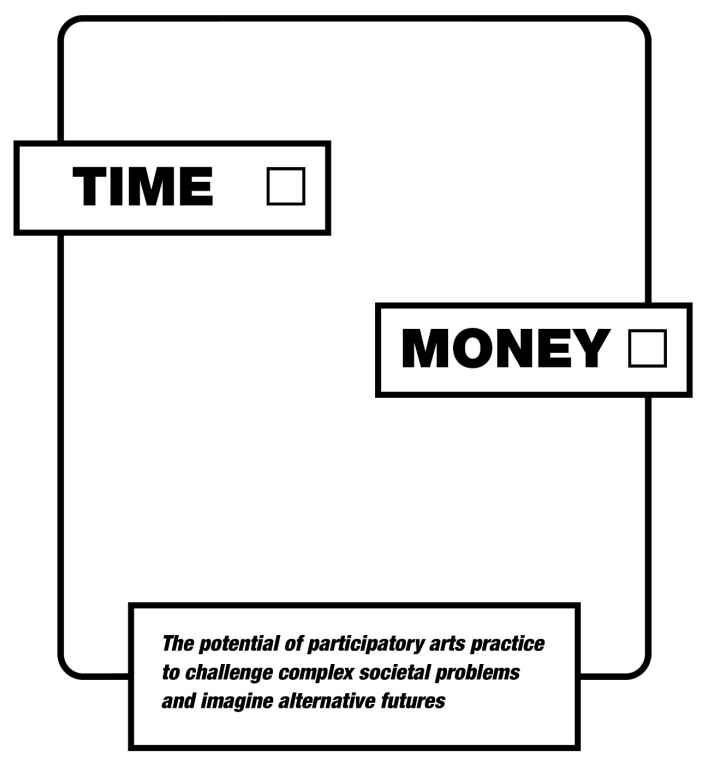This is the thesis I wrote for my practice-based PhD. It was undertaken in the Fine Art Department at Newcastle University (2017 – 2022) in partnership with Helix Arts. The thesis documents the practice-based research methods I developed and the participatory art projects I created to conduct the research. You can download a PDF here. See below for abstract.
My research explored how participatory arts practices can be used as a method for critically reflecting on issues of active citizenship, re-evaluating our current relationships to work, and informing understandings of a post-work society. I found that participatory arts projects can create friction and tensions within the routines of our daily lives by asking questions that can help to shift our understanding, without providing concrete solutions or claiming to empower. This can create space for conjecture that allows participants to challenge the narratives they use to understand their identity and place in the world, which can also act as an entry point to wider political discussions and civic participation.
A key aspect of my research was Universal Basic Income (UBI) – a regular and unconditional monthly payment with no requirement to work, or loss of the income if someone carried out additional paid or unpaid work. I argue that UBI would challenge the logic of the work centred society we currently live in, by providing everyone with a secure income, which would give us more control over our time and more agency to engage in activity outside of the labour market. Counter to the popular myth that UBI would disincentivise work and make everyone lazy, it would enable more people to engage in forms of work that they are passionate about, and more time could be invested in collective goals that benefit wider society, rather than generating profit for individuals.
My belief in the emancipatory potential of UBI has been informed by my experience during the PhD, which itself acted as an experiment into what the potential of something like UBI might be like. The stipend I received functioned like a Basic Income which provided me with the financial security and resources to engage in forms of active citizenship and consciousness raising experiences. Undertaking the PhD also validated my work as an artist, giving me a level of status and purpose, by elevating my activity to “research”, rather than of an expensive hobby or pastime
Abstract
This thesis explores how participatory arts practice can engage issues of active citizenship,
interrogate current relationships to work and inform understandings of a post-work society.
To conduct the research, I used a practice-based approach which in this context manifested
as a series of interactive exhibitions that were presented in a variety of public spaces. These
interactive exhibitions posed open questions designed to provoke conversation while
creating space and time for participants to engage in critical reflection outside of their daily
routines.
We live in a climate where we work long hours in demanding jobs, which limits our ability to
engage in activities outside of employment and our individual concerns. Universal Basic
Income (UBI) could help to challenge this situation by decoupling income from work and
providing people with the financial security, enabling them to become active citizens.
However, the policy is often viewed as utopian and therefore politically unachievable.
Research suggests that this is caused by Capitalist Realism and time poverty which restricts
people’s ability to imagine alternative ways of living and working, leading to a state of
consciousness deflation.
My findings show that through its capacity for mimesis and role-play, participatory arts
practice can counteract Capitalist Realism by creating a sense of defamiliarization and
estrangement that enables a shift in perspective, allowing alternative visions of the future
and new political imaginaries to emerge. My research demonstrated that participatory arts
practice can create platforms for participants to interact with others in a process of dialogue
and exchange that enables them to challenge personally held narratives and beliefs and to
disentangle complex social and behavioural protocols. Through this process I was able to
communicate ideas like UBI in a way that did not need to win a debate and could move
beyond ideological barriers.
